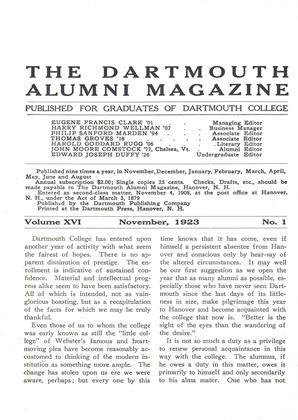(From the New York Times)
President Hopkins of Dartmouth College has stated in an especially vigorous and lucid way the old, old problem that is still newly confronting all civilized peoples. He has used unusual phrases, and has in this fresh restatement helped to make the problem clearer which is making some progress toward its solving. As he states it, this problem is "how to preserve to the needs of civilization the initiative and vigor and originality of individualism in conjunction with the responsibilities and necessities of associationalism." This sounds somewhat academic, but it is doubtful if there could be a more concise and accurate definition. Reduced to a phrase, it would be "associational individualism." This is not far from the phrase of Radek, the Soviet spokesman, collective individualism." In both cases the substantive is "individualism,' and in both cases it is qualified by a concern and a cooperation for the collective welfare.
But President Hopkins has not stopped with stating the problem, nor sat down complacently rolling a sweet-morseled phrase under his tongue. He has characterized the disservice of the professionalized group who style themselves liberal with a capital "L" and arrogate to themselves all virtue and good intent. Like the Pharisees, they stand in prominent places, capitalize dogmatic assertion and boast of their assumed liberality. The harm to society of the downright reactionnaries who are seen for what they are is not so great as of these exploiters of liberalism who "ruminate with melancholy gratification upon unhappiness and discontent and distrust," and who, with all their vaunted liberalism, are intolerant of the opinion of others and closed of mind against conviction by new knowledge.
The President of Dartmouth has - performed another helpful mental service in distinguishing between "education" and mere "training." He holds, for example, that though institutions which are designed to further on the one hand the interests of labor or on the other to defend capitalism, to promote some denominational contention or theological belief, to assist democracy or justify despotism, may call themselves "colleges," they are rightfully only "training schools." A college, to make good its claim to being a real educational institution, must have as its sole aim and goal the search for and conformity to the truth," and must manifest that purpose in method as well as in spirit. The goal of education as well as of all society will be reached not by a soft, loose liberalism, but by hard-thinking individualized struggle, animated by a concern for the common good — that is, by associational individualism.
 View Full Issue
View Full Issue
More From This Issue
-
 Article
ArticleTHE GOAL OF EDUCATION
November 1923 By ERNEST MARTIN HOPKINS -
 Article
ArticleDartmouth College has entered upon
November 1923 -
 Article
ArticleAFTER TEN YEARS
November 1923 By FRANK LATIMER JANEWAY -
 Class Notes
Class NotesCLASS OF 1910
November 1923 By Whitney H. Eastman -
 Class Notes
Class NotesCLASS OF 1903
November 1923 By Perley E. Whelden -
 Class Notes
Class NotesCLASS OF 1917
November 1923 By Ralph Sanborn







